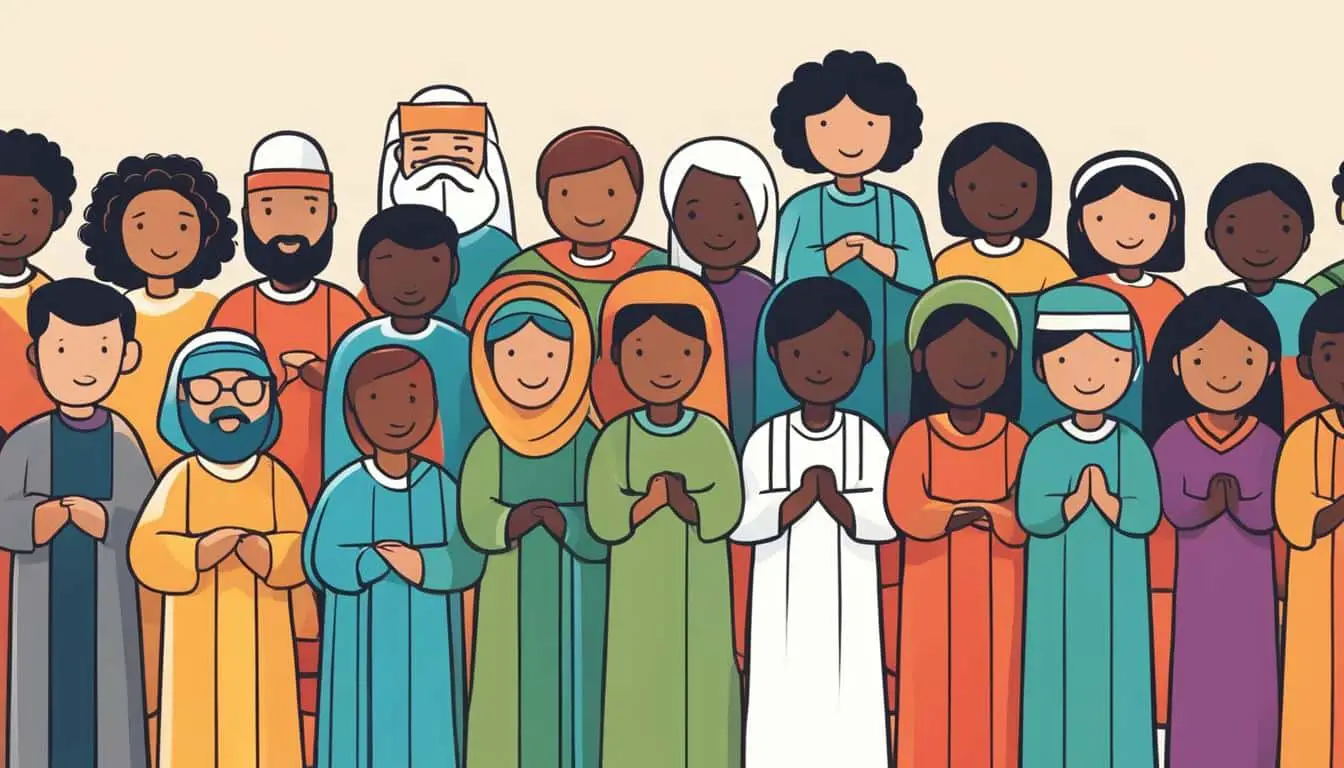
When it comes to discussions about equality and discrimination, the Bible holds valuable insights. Scripture provides a moral compass, guiding us on how to treat others with fairness, respect, and dignity. The teachings found within the Bible emphasize the inherent worth of every individual and call for justice in all aspects of life.
Key Takeaways:
- Biblical teachings emphasize the importance of treating all individuals with equal respect and dignity.
- The Bible teaches that all individuals are equal in the eyes of God, regardless of race, social status, or gender.
- Discrimination based on factors such as race, ethnicity, or social class goes against the principles of justice and equality taught in the Bible.
- The Old Testament highlights the importance of justice and equality, particularly for the marginalized and vulnerable.
- Jesus’ teachings in the New Testament promote inclusivity, radical equality, and acceptance of individuals from all backgrounds.
Equality in the Bible
The Bible teaches that all individuals are equal in the eyes of God. Galatians 3:28 states, “There is neither Jew nor Gentile, neither slave nor free, nor is there male and female, for you are all one in Christ Jesus.” This verse highlights the equality of all believers regardless of race, social status, or gender. It emphasizes the importance of treating everyone with fairness and respect, rejecting discrimination based on these differences.
In the Bible, the concept of equality flows from the belief that all human beings are created in the image of God and possess inherent worth and value. This foundational principle sets the stage for a society that values the dignity and rights of each individual, promoting a just and fair community.
A critical aspect of biblical teachings on equality is the rejection of discrimination. Throughout scripture, believers are called to love their neighbors as themselves and to treat others as they would like to be treated. This emphasis on fairness and respect transcends societal divisions and challenges biases rooted in race, social class, or gender.
“There is neither Jew nor Gentile, neither slave nor free, nor is there male and female, for you are all one in Christ Jesus.” – Galatians 3:28
The passage in Galatians emphasizes the unity of believers in Christ, where no distinctions exist among individuals. It serves as a powerful reminder that God’s love and acceptance extend to all, regardless of their background or social standing. This message reinforces the biblical mandate to treat one another as equals, embodying the values of justice and equality.
By embracing the teachings on equality found in the Bible, believers can work towards creating a society that honors human dignity, upholds the principles of justice, and rejects discrimination in all its forms. Through acts of kindness, inclusivity, and advocacy for equal treatment, Christians can contribute to a world that reflects the timeless wisdom of biblical scripture.
| Biblical Teachings on Equality | Key Scripture References |
|---|---|
| Equality among believers | Galatians 3:28 |
| Love your neighbor as yourself | Matthew 22:39 |
| Equality rooted in the image of God | Genesis 1:27 |
| Rejecting discrimination | Leviticus 19:15 |
Discrimination in the Bible
The Bible unequivocally condemns all forms of discrimination and prejudice. Leviticus 19:15 states, “Do not pervert justice; do not show partiality to the poor or favoritism to the great, but judge your neighbor fairly.” This powerful verse underscores the fundamental importance of treating all individuals fairly and impartially, regardless of their social or economic status.
Discrimination based on factors such as race, ethnicity, or social class stands in direct opposition to the principles of justice and equality that the Bible teaches. The teachings of the Bible emphasize the inherent worth and dignity of every individual, appealing to believers to love and respect their neighbors as themselves.
“Do not pervert justice; do not show partiality to the poor or favoritism to the great, but judge your neighbor fairly.” – Leviticus 19:15
This verse implores believers to embrace fairness and impartiality, deflecting any form of discrimination that may arise from biases or prejudices. It reinforces the biblical teachings that advocate for justice and equality as integral components of a just and righteous society.
As Christians, it is essential to actively challenge discrimination in all its forms, rejecting attitudes and actions that undermine the principles set forth in the Bible. By doing so, we contribute to the creation of a world that upholds the values of justice, equality, and human dignity.
Now let’s explore how justice and equality are reinforced throughout the Old Testament in Section 4.
Justice and Equality in the Old Testament
The Old Testament of the Bible contains numerous passages that emphasize the importance of justice and equality. Proverbs 31:8-9 encourages believers to “speak up for those who cannot speak for themselves, for the rights of all who are destitute. Speak up and judge fairly; defend the rights of the poor and needy.” These verses call for the promotion of justice and equality, particularly for the marginalized and vulnerable members of society.
“Speak up for those who cannot speak for themselves, for the rights of all who are destitute. Speak up and judge fairly; defend the rights of the poor and needy.”
– Proverbs 31:8-9
The Old Testament highlights the duty of believers to advocate for justice and equality. It emphasizes the importance of speaking out against injustice, standing up for the rights of the vulnerable, and ensuring fair treatment for all individuals.
The Pursuit of Justice
Throughout the Old Testament, justice is depicted as an integral part of God’s character. The concept of justice encompasses the fair and impartial treatment of all individuals, regardless of their social, economic, or personal circumstances.
One notable example of justice in the Old Testament is the establishment of laws that aim to protect the rights of the marginalized and promote social equality. These laws include provisions for caring for widows, orphans, foreigners, and the poor, ensuring their fair treatment within society. For instance, Exodus 23:6 states, “Do not deny justice to your poor people in their lawsuits.”
The Old Testament also places a strong emphasis on the role of judges and leaders in upholding justice. Deuteronomy 16:18-20 instructs judges to “administer justice fairly, without partiality,” ensuring that all individuals receive equal treatment under the law.
The Call for Equality
Equality is another key theme that runs through the Old Testament. It emphasizes that all individuals are created in the image of God and have inherent worth and value. This foundational belief forms the basis for the call to treat each other with fairness, love, and respect.
As shown in Proverbs 31:8-9, believers are called to advocate for the rights of the destitute, speaking up for those who cannot speak for themselves. This call to action highlights the importance of standing up against oppression and discrimination, particularly towards the disadvantaged and marginalized members of society.
“Do not pervert justice; do not show partiality to the poor or favoritism to the great, but judge your neighbor fairly.”
– Leviticus 19:15
Leviticus 19:15 emphasizes the need for impartiality in the administration of justice, warning against showing favoritism to the poor or the influential. It emphasizes the equal worth and dignity of all individuals, regardless of their social standing.
The Old Testament’s teachings on justice and equality serve as a timeless reminder of the importance of treating all individuals with fairness, respect, and love. They call believers to actively pursue justice, defend the rights of the oppressed, and work towards creating a society where equality and justice prevail.
Jesus and Equality in the New Testament
Jesus Christ’s teachings in the New Testament demonstrate a strong emphasis on equality and the rejection of discrimination. In Matthew 22:39, Jesus states, “Love your neighbor as yourself.” This commandment promotes the idea of treating others with the same love, respect, and fairness that one would expect for oneself.
Furthermore, Jesus challenged societal norms during his ministry, interacting with individuals from different social statuses, genders, and ethnic backgrounds. His actions demonstrated a radical inclusivity and equality, breaking down barriers and eradicating prejudices.
“But I say to you, love your enemies and pray for those who persecute you, so that you may be children of your Father in heaven. For he makes his sun rise on the evil and on the good, and sends rain on the righteous and on the unrighteous.” – Matthew 5:44-45
Jesus’ teachings and actions exemplify a commitment to embracing and uplifting all individuals, regardless of their background or circumstances. His message of love, acceptance, and equality continues to inspire and empower people today.
Jesus and Women
Jesus’ interactions with women were particularly revolutionary for his time. He treated women with respect, dignity, and equality, challenging the prevailing cultural norms that marginalized them. One notable example is his encounter with the Samaritan woman at the well (John 4:1-42). Despite the social and religious barriers of the time, Jesus engaged in a meaningful conversation with her, acknowledging her as a valued individual.

Jesus and Social Outcasts
Jesus’ ministry also focused on providing compassion and equality for social outcasts, including tax collectors, lepers, and prostitutes. Through his actions, Jesus emphasized that no one is beyond redemption and that all individuals should be treated with love and respect.
| Social Outcasts | Jesus’ Response |
|---|---|
| Tax Collectors (Matthew 9:9-10) | Jesus called Matthew, a tax collector, to be his disciple, demonstrating his acceptance and willingness to associate with those considered societal outcasts. |
| Lepers (Luke 17:11-19) | Jesus healed ten lepers, illustrating his compassion for those who were marginalized and excluded from society. |
| Prostitutes (Luke 7:36-50) | Jesus showed compassion and forgiveness to the repentant prostitute who washed his feet with her tears, challenging societal judgment and offering redemption. |
Jesus’ teachings and interactions with social outcasts highlight his commitment to equality and inclusivity, inspiring us to do the same in our interactions and relationships.
Applying Biblical Equality in Modern Society
The teachings of equality in the Bible provide a framework for addressing discrimination and promoting justice in modern society. As a believer, I am called to apply these principles in my daily life and actively work towards building a more egalitarian world.
One way to apply biblical equality is by advocating for equal rights and opportunities for all individuals. This means standing up against discrimination based on race, gender, socioeconomic status, or any other characteristic. By working towards creating a society where everyone has the same access to education, employment, healthcare, and other fundamental rights, we can promote fairness and inclusivity.
Challenging systemic discrimination is another important aspect of applying biblical equality. This involves recognizing and addressing the institutional barriers that perpetuate inequality. By advocating for policy changes, supporting organizations that fight against discriminatory practices, and engaging in informed discussions on social issues, we can contribute to dismantling unjust systems and creating a more equitable society.
Example: Promoting Gender Equality
A significant area where we can apply biblical equality is in promoting gender equality. By recognizing the inherent worth and dignity of women and advocating for their equal rights and opportunities, we can challenge gender-based discrimination. This includes supporting initiatives that strive for equal pay, gender-balanced leadership positions, and an end to gender-based violence.
“There is neither Jew nor Gentile, neither slave nor free, nor is there male and female, for you are all one in Christ Jesus.” – Galatians 3:28
This verse reminds me that in the eyes of God, there is no distinction or hierarchy based on gender. It urges me to challenge societal norms that perpetuate gender inequality and to affirm the equal worth and value of every individual, regardless of gender.
Applying biblical equality also means actively pursuing social justice issues. It requires me to be aware of the injustices around me and take action to address them. This may involve volunteering with organizations that support marginalized communities, speaking out against racism and discrimination, or supporting policies that promote economic equality.
Example: Promoting Racial Equality
Recognizing the dignity of every person, I am called to work towards racial equality. This means examining my own biases, educating myself about systemic racism, and actively engaging in anti-racist efforts. By advocating for fair treatment and opportunities for people of all races, I can contribute to creating a more just and inclusive society.
Applying biblical equality in modern society is an ongoing journey that requires self-reflection, humility, and a commitment to justice. It involves treating every individual as a reflection of God’s image and actively working towards eliminating discrimination in all its forms.

| Ways to Apply Biblical Equality | Examples |
|---|---|
| Advocating for equal rights and opportunities for all individuals | Promoting gender equality through initiatives for equal pay and gender-balanced leadership positions |
| Challenging systemic discrimination | Supporting policies that address racial inequality and advocating for equitable access to resources |
| Actively pursuing social justice issues | Volunteering with organizations that support marginalized communities and speaking out against racism and discrimination |
Conclusion
The biblical teachings on equality and discrimination provide a solid foundation for fostering a just and egalitarian society. The scriptures emphasize the inherent worth and value of every individual, calling believers to treat others with fairness, respect, and love. By upholding these principles in modern society, Christians can actively contribute to building a better world.
Embracing biblical views on equality means recognizing and honoring the human dignity of all people. It means rejecting discrimination based on factors such as race, gender, socioeconomic status, or any other characteristic. The Bible teaches believers to extend love and justice to all, without showing partiality or favoritism.
Applying these teachings in our daily lives and communities requires a commitment to advocating for equal rights and opportunities for all individuals. It means challenging systemic discrimination and actively working towards social justice. By doing so, we can create a society that reflects the values of fairness and equality taught in the scriptures.
In conclusion, the Bible offers profound insights on the importance of equality and the condemnation of discrimination. By embracing these teachings, we can contribute to a society that not only upholds human dignity but also promotes justice and fairness for all. Let us strive to live out these principles and work towards a world where equality is embraced and discrimination is eradicated.
FAQ
What does the Bible teach about equality?
The Bible teaches that all individuals are equal in the eyes of God. Scripture emphasizes the importance of treating everyone with fairness and respect, rejecting discrimination based on race, social status, or gender. Galatians 3:28 states, “There is neither Jew nor Gentile, neither slave nor free, nor is there male and female, for you are all one in Christ Jesus.”
Does the Bible condemn discrimination?
Yes, the Bible condemns all forms of discrimination and prejudice. Leviticus 19:15 states, “Do not pervert justice; do not show partiality to the poor or favoritism to the great, but judge your neighbor fairly.” Scripture underscores the importance of treating all individuals fairly and impartially, regardless of their social or economic status.
Are there teachings on justice and equality in the Old Testament?
Yes, the Old Testament of the Bible contains numerous passages that emphasize the importance of justice and equality. Proverbs 31:8-9 encourages believers to “speak up for those who cannot speak for themselves, for the rights of all who are destitute. Speak up and judge fairly; defend the rights of the poor and needy.” These verses call for the promotion of justice and equality, particularly for the marginalized and vulnerable members of society.
What did Jesus teach about equality in the New Testament?
Jesus Christ’s teachings in the New Testament demonstrate a strong emphasis on equality and the rejection of discrimination. In Matthew 22:39, Jesus states, “Love your neighbor as yourself.” This commandment promotes the idea of treating others with the same love, respect, and fairness that one would expect for oneself. Jesus also challenged societal norms during his ministry, interacting with individuals from different social statuses, genders, and ethnic backgrounds, demonstrating a radical inclusivity and equality.
How can the teachings of equality in the Bible be applied in modern society?
The teachings of equality in the Bible provide a framework for addressing discrimination and promoting justice in modern society. Christians can apply these principles by advocating for equal rights and opportunities, challenging systemic discrimination, and actively pursuing social justice issues. By recognizing the inherent worth and dignity of every person, Christians can work towards eliminating discrimination based on race, gender, socioeconomic status, or any other characteristic.
How do biblical views on equality and discrimination contribute to building a just society?
The Bible offers a strong foundation for promoting equality and denouncing discrimination. Its teachings emphasize the inherent worth and value of all individuals, calling believers to treat others with fairness, respect, and love. By applying these principles in modern society, Christians can contribute to building a more just and egalitarian world. Embracing biblical views on equality and anti-discrimination is crucial for fostering a society that honors human dignity and upholds the principles of justice.








